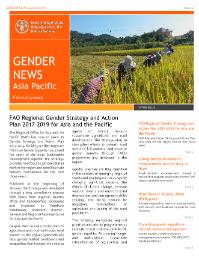Gender Newsletter Asia Pacific February 2017
The Regional Office for Asia and the Pacific (RAP) has now in place its Gender Strategy and Action Plan 2017-2019. Building on the corporate Policy on Gender Equality (2012) and the spirit of the 2030 Sustainable Development Agenda, the Strategy provides new focus to gender-related work in the region and identifies main delivery mechanisms for the next three years.



